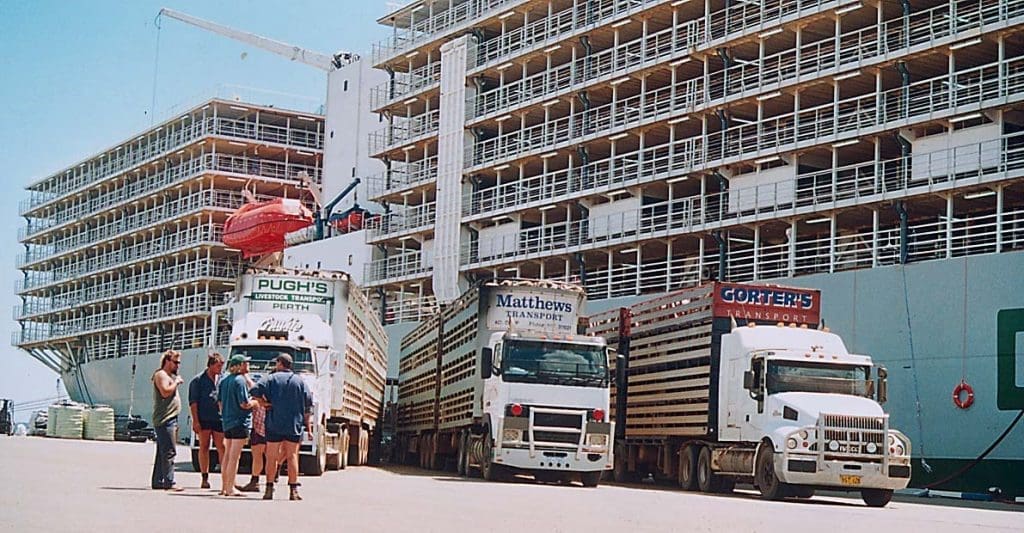THE Department of Agriculture and Water Resources says livestock exporters will not be forced to take independent observers on future voyages where vessels aren’t large enough to accommodate an observer without displacing a necessary staff or crew member.
DAWR has told Beef Central this week that in such cases exporters will be required to use an existing employee or agent to collect additional information about the voyage and to provide it to the department (more below).
Federal Agriculture Minsiter David Littleproud has announced independent observers will be required on every future livestock export voyage, as part of a Federal Government crackdown on the industry after footage emerged eariler this year of dead and dying heat-stressed sheep on the Awassi Express en-route to the Middle East.
It has taken some months since that announcement for the DAWR to develop the practical detail that will underpin the program, with the starting date pushed back twice already. The independent observer program is now scheduled to take effect from the start of November.
Barring further delays, livestock exporters will be required to cover the additional cost of having an independent observer appointed by the Government on all future export shipments they send.
The job of the observer will be to monitor and report on all aspects of management from loading in the Australian port to unloading in the international port of destination, taking daily photos and recording observations about animals’ access to water, feed, and adequacy of the ventilation.
DAWR has indicated that reports from independent observers will be published, but there are no details yet on how their reports will be disseminated.
The department says modelling based on the number of voyages that departed Australia in 2016 and 2017 indicate that between 20 and 30 independent observers will be required.
It has been seeking to recruit observers so far from existing departmental employees.
There has been some talk that DAWR has not been able to fill all of the positions from within the department.
Asked if that was the case, a DAWR spokesperson said the department may also seek to fill vacancies for independent observers externally, such as veterinarians or others with suitable skills.
But ultimately there would be enough independent observers to do the job required, the spokesperson indicated.
“The department is ensuring that the availability of independent observers will not be a limiting factor for the trade,” the spokesperson said.
Exporters will be required to cover the cost of having independent observers on board their shipments. The cost structure determined by the Department involves a daily fee of $1290, and the cost of a business class flight to return the observer from the destination port back to Australia.
The fee structure would equate to costs of about $20,000 for a 10-day journey.
The DAWR spokesperson said the daily fee covers the department’s costs of placing independent observers on voyages which includes their salaries and other associated costs, and the onshore support of providing the independent observer program.
“The fee is calculated to recover no more than the reasonable cost of delivering the program,” the DAWR spokesperson said.
Exporters say the government is adding unnecessary expense to the industry, and believe independent observers should only be required on higher risk journeys, not routine shorter voyages with proven strong welfare records.
Ships won’t be forced to displace necessary staff
Exporters are also concerned about the potential for the measure to inadvertently cause negative livestock welfare outcomes.
The number of staff and crew each ship can carry is limited by its accommodation facilities and, even more importantly, its lifeboat capacity. Even larger ships are regularly “maxed out” in the number of staff and crew they can carry by life boat capacity. Exporters say it will not help welfare outcomes to replace a necessary performing crew member with an independent observer taking photos.
It does appear, though, that there will be some flexibility within the new rules to prevent the program itself becoming the cause of perverse welfare outcomes.
“In instances where the exporter provides a declaration that a vessel cannot accommodate an independent observer without displacing a necessary crew member such as a stockperson, the department will place additional licence conditions on exporters,” the DAWR spokesperson said.
“These conditions require exporters, either directly or through employees or agents, to collect additional information about the voyage and to provide it to the department.
“The information is consistent with what an independent observer collects, including daily photos and observations about animals’ access to water, feed, and adequacy of the ventilation.”
This was most likely to occur on short haul voyages supplied by smaller vessels.

